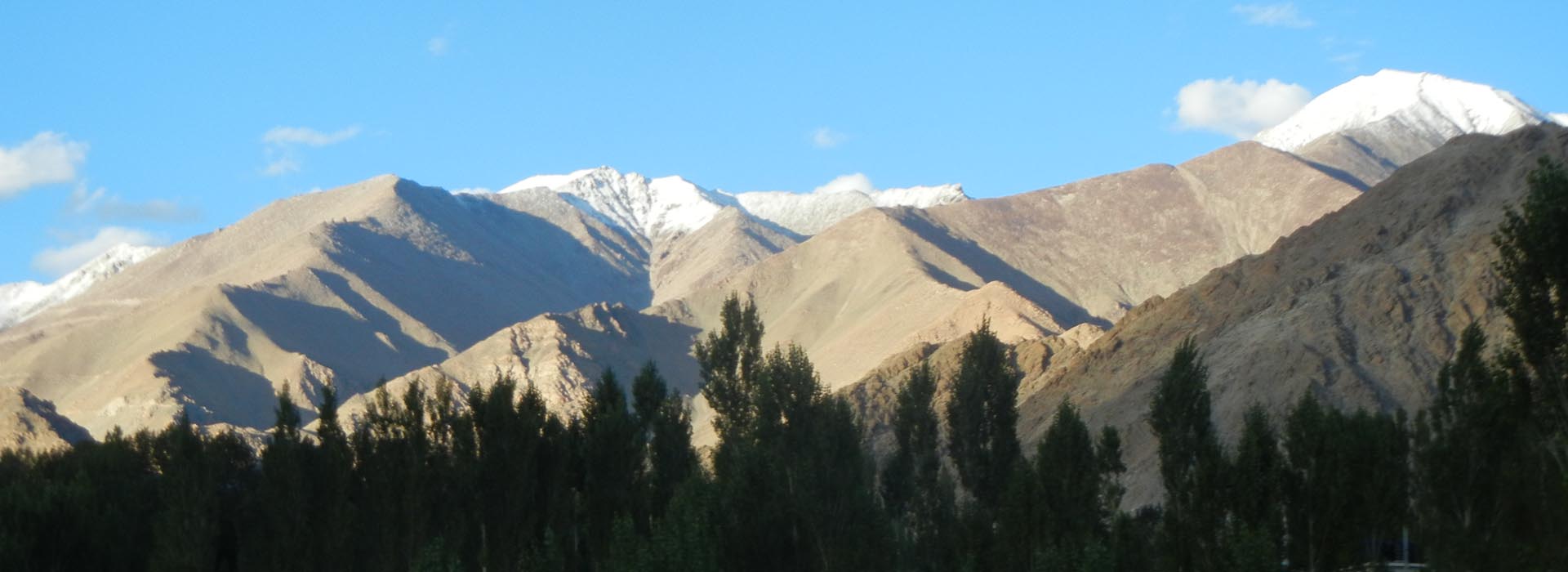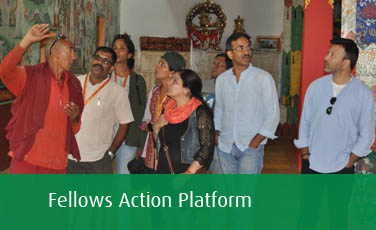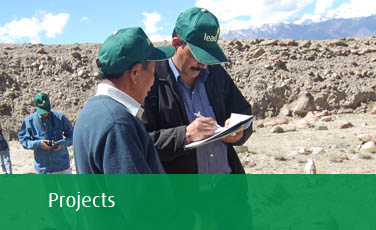
Creating leaders and subsequent change, ultimately lead to action on the ground. With our commitment to creating a catalyst for change, LEAD India also provides a platform to implement and undertake collective action related projects that fulfil the overall purpose of sustainable development.
Leadership Actions
LEAD’s Initiatives
Benefit Sharing Water Governance
Rapidly deteriorating water quality is a major concern for India’s society, economy and the environment. This is attributed to the on-going effects of climate change and anthropogenic activities including the unhindered discharge of city, municipal and agricultural waste into rivers and aquifers. Water governance or management in South Asia has usually been driven in isolation by a few government departments or ministries, without meaningful participation from the civil society organisations (CSO) and communities who are directly affected by decisions made by these actors.
With this in mind, LEAD India’s benefit sharing project aimed at building leadership capacity of civil society for benefit sharing of Indus Basin water management, intending to provide solutions for the vulnerable communities. It also enabled concerned stakeholder dialogues to develop shared understanding towards water governance and enhance engagement with decision makers.
The program had 10 professionals from CSO’s/ NGO’s in order to articulate community demands and engage effectively with decision making on priority water issues with regards to the Indus Basin; and subsequently facilitating regional and national water policy dialogues. The program was delivered through exclusively designed modules that meet the needs of participants and ensure them on a path of transformative learning and enhance their leadership capacity in an integrated and interdisciplinary manner.
With this in mind, LEAD India’s benefit sharing project aimed at building leadership capacity of civil society for benefit sharing of Indus Basin water management, intending to provide solutions for the vulnerable communities. It also enabled concerned stakeholder dialogues to develop shared understanding towards water governance and enhance engagement with decision makers.
The program had 10 professionals from CSO’s/ NGO’s in order to articulate community demands and engage effectively with decision making on priority water issues with regards to the Indus Basin; and subsequently facilitating regional and national water policy dialogues. The program was delivered through exclusively designed modules that meet the needs of participants and ensure them on a path of transformative learning and enhance their leadership capacity in an integrated and interdisciplinary manner.
Securing Tribal Livelihoods in Odisha
Securing Tribal Livelihoods in Odisha between 2012-2016 in Raygada and Gajapati district of Odisha. It was aimed at improving food security for 3,000 households comprising of approximately 15,000 people, including women and persons with disabilities.
LEAD India adopted a holistic approach to increase income though farm and non-farm based livelihood options, enhance health and nutrition, optimum utilization of government schemes and integrating climate change adaptation interventions.
The project strengthened the farmers’ groups and cooperative activities to establish sustainable livelihoods, encourage better natural resource management, enhance their skills base, and foster local market linkages. It also addressed the menace of malaria, which is endemic in this region.
LEAD India adopted a holistic approach to increase income though farm and non-farm based livelihood options, enhance health and nutrition, optimum utilization of government schemes and integrating climate change adaptation interventions.
The project strengthened the farmers’ groups and cooperative activities to establish sustainable livelihoods, encourage better natural resource management, enhance their skills base, and foster local market linkages. It also addressed the menace of malaria, which is endemic in this region.
Building Sustainable Livelihoods in Great Nicobar Islands
Building Sustainable Livelihood on Tsunami Affected Great Nicobar Island was started in 2009 and completed in 2012. The project was undertaken to generate sustainable livelihood opportunities through capacity building and empowerment of the rural households in the Great Nicobar Islands.
The approach adopted by the project focused on building and working with the existing human capital and local resources. The approach was to inform, enable, initiate and empower appropriate choices for long-term well-being. The project, since the date of its inception, has involved all sections of the society across class, gender and other divides.
The project delivered a combination of interventions to enhance the capacity of farmers on integrated farming systems and supported other stakeholders to improve their livelihoods. It also promoted community entrepreneurial activities to strengthen sustainable livelihoods.
The approach adopted by the project focused on building and working with the existing human capital and local resources. The approach was to inform, enable, initiate and empower appropriate choices for long-term well-being. The project, since the date of its inception, has involved all sections of the society across class, gender and other divides.
The project delivered a combination of interventions to enhance the capacity of farmers on integrated farming systems and supported other stakeholders to improve their livelihoods. It also promoted community entrepreneurial activities to strengthen sustainable livelihoods.
Climate and Development Knowledge Network (CDKN)
Established in 2010, CDKN in India was operational through LEAD India from April 2012 to June 2017. The program aimed at connecting policy-makers and organizations in developing countries with climate change experts to help them adapt to the climate change impacts and build capacity for a low-carbon economy. It was funded by the UK’s DFID DGIC.
Strengthening Women Engagement and Leadership in the Manufacturing sector
Supported by Ford Foundation, Lead India is implementing a project with focus on strengthening women engagement and leadership in the manufacturing sector. It is a unique project with focus on creating an enabling environment for women’s participation in the organized sector, through simultaneous interventions in the community and in the workplace.
This is the first time such a project is being implemented in the country. The three-year project started in April 2018. Lead India will work closely with two manufacturing industries to implement this project within the factory and in the neighbouring communities.
This is the first time such a project is being implemented in the country. The three-year project started in April 2018. Lead India will work closely with two manufacturing industries to implement this project within the factory and in the neighbouring communities.
Youth Initiatives
YLACM
-
Gender sensitization of school students
Created a Training guide manual to aid trainers, to start a discussion or ideas for trainers around gender sensitization among school going children. ( In English and Hindi ‐ for long and short workshop) Conducted workshop in 3 schools in Delhi NCR, 300 plus students covered. -
Girl child-friendly school
Created a brochure on Girl friendly schools based on secondary research their consultation with a number of stakeholders. They will now use this as a tool to sensitize many others -
Substance abuse among youth
Secondary research and consultation with NGOs were conducted to create a module on sensitizing the youth about substance abuse. Research questionnaire given and workshop done at schools in Dwarka, Delhi and Chandigarh -
Gender sensitization and menstrual health among school students
Modules were created, schools were contacted, workshops conducted in the school and community, health camps with NGOs organised in the community in Jamia -
To explore the status of women in leadership roles, especially in Politics
Organised a film screening at Ashoka University followed by facilitating a discussion on women’s empowerment, including their engagement in active politics. -
Awareness, behavioural change about menstrual health and practices
Modules created, pilots done in Rajasthan with women’s group, engaging medical doctor for consultation, consultation with Delhi University students planned, mapping their learning journey for photodoc - Representation and perpetuation of gender bias, norms, stereotypes, and roles in the media we consume
-
Creating awareness of gender‐Stigma free society
Conducted workshops with women of different communities at different colonies in Delhi (eg. women of Sadha community in JJ Colony). -
Menstrual hygiene awareness
Secondary research to inform any communication campaign directed towards mentrual health awareness among the bottom of the pyramid -
Getting school drop‐outs back to skill building or open school format
Has worked with 12 dropout youth in Madanpur Khadar and got them back to complete education through open school and join skill building course -
Creating a culture of peace through peace education in school
Created modules and facilitated workshops in 3 schools in 3 cities including Delhi. The peace education workshops touch on 3 dimensions ‐ Inner Peace, Social Peace & Environmental Peace. -
Road safety awareness
Working on creating awareness on Road safety among a wide range of stakeholdres‐ children, law makers, health professionals etc. As a part of the project has expressed interest to LEAD, about organising a first response workshop for the Cohort as a part of YLACM project. -
Mental health
Collaborating with the organisations to make Mindfulness a mandate practise for their employees. Onboarding Private and Government schools to make Mindfulness a mandatory practical subject in the curriculum. At a concept stage right now, exploring expert help and collaborations -
Hunarshala
Creating an open learning space(Hunarshala) in a village name Aspura near Jaipur. Have introduced farming, designing, menstrual cups awareness, storytelling, documenting films etc. He is doing with a project through a carpent company in the Rajahstan village. Conducting various workshops invoking the artistic sense in the communities. They started work especially with untouchables. The confidence level of the youth in community has gone up. The program is empowering the community to express their own needs, problems and exploring different opportunities. -
Helping Women become Independent
Worked with womens group in Chandu village in Gurgaon through an NGO ACCESS Development services. where he supported women in their entrepreneurial journey and planned events for them at various hotels and malls of Delhi NCR. He helped them in forging collaboration with. Stores like La Marche, Reliance Foods, Anna Maya to sell their products. -
Recycling waste clothes to use as bags, an alternative to plastic bags
He had consultations with shop owners, retails of what kind of cloth bags would they buy, how much would they pay and etc. He has created a prototype and is mobilising the shopkeepers to sell the sturdy reusable bag at 10‐20 INR to customers
YLESA
-
Revitalized minds
Mental health issues were seen on an increase during the Pandemic. At the time when direct access to health services decreased, these intervention was an attempt to look at strengthening various services in three different locations that could help support youth and children with mental health issues. -
Unscramble
Integrating creative expression in formal and non formal education to accelerate learning and have a healthy mental health. Done in three locations the intervention was an attempt during the period when children missed out on formal schooling. -
Women For Women
Women were impacted in multiple ways during COVID. This virtual platform is an attempt to create a virtual community that can initiate meaningful purpose-driven conversations that can empower women members. It was a response to the felt need as expressed by many women that the team reached out to. -
Adi Shakti
At a time when violence against women, including shadow violence in the form of domestic violence, increased during the Pandemic, more than 200 women signed up for these awareness sessions offered by this group. Clearly a demand-driven initiative, so compelling and relevant during these times. -
ILearn4me
During COVID, the first generation learners sufferd most while missing out on school without access to internet technology. Timely, this group engaged with the children in a fun filled creative learning process virtually that the outcome was multi-dimensional, English language skills, cognitive, emotional, and build their personality too. The children are now asking for continuing this beyond the project period -
Maitri
The initiative was an effort to build capacities of women with skills for an alternative source of livelihood -
Prayaas
During COVID, children from economically diadvantaged section sufferd most while missing out on school, without access to internet technology. Timely, this group engaged with the children demonstrating science experiments, to support them in their learning outcomes, and also prevent dropout -
Dayitva
For two years, due to break in physical school and college, students missed out on career counselling and guidance sessions. This intervention supported them to fill this gap, iby generating awareness and preparing for interviews -
Project Dignity
During COVID, there was a gap in the way daily wage labouers were being engaged in work, without attention to health and safety standards and many other factors. The project raises awareness among this community and others also, to inspire them to work towards bringing a change in this system -
Saarathi
Students are vulnerable to many social evils. The numbers were seen to increase during the COVID when the schools were shut. In a fun way the comic inspires students to choose healthy practices and not to engage in vices. -
the Mann talks
During COVID Pandemic, the mental health of children and youth was impacted. The initiative was an attempt to address that with 20 children who were identified. Through a fun workshop, they were engaged to become more aware about themselves. A virtual community has been formed to hold them further and also keep their families informed. -
Action against Plastic Pollution
During & after COVID Pandemic peaked the Mithi river has been more polluted with single waste plastic along with masks, syringes etc which flows into the sea therefore cleaning drives are being organized through this initiatives where hundred are volunteering every other weekend. -
Super 44 Social Action for the COVID effected
A group of 44 members held space during the 2nd wave of Covid for those who need help in different ways. They have reached out to 700 plus people and provided logistics and emotional support.


